| Srl | Item |
| 1 |
ID:
101326
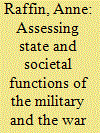

|
|
|
|
|
| Publication |
2011.
|
| Summary/Abstract |
Studies on the military in Vietnam today see a concurrence between the changing role of the army-its growing economic role as well as its role as a tool to control the Vietnamese population-and the changing economy and international environment. How do we make sense of this evolution and its impact on civil-military relations in terms of power relations and authority? This study seeks to provide an analytical framework that shows how the military is not a homogeneous entity but rather is made up of various groups that derive uneven benefits from the post-cold war situation. The author's contribution is primarily at the conceptual level, stressing the dynamics of power relations among the military, society, and state from a Weberian perspective. Doi moi, as an era of economic and social change, has redefined power relations. The author also emphasizes the generational and historical elements in civil-military relations that are specific to Vietnam.
|
|
|
|
|
|
|
|
|
|
|
|
|
|
|
|
| 2 |
ID:
078523
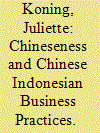

|
|
|
| 3 |
ID:
096521
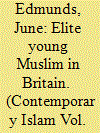

|
|
|
| 4 |
ID:
147661
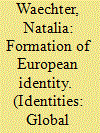

|
|
|
|
|
| Summary/Abstract |
Research into European identity has mostly focused on majority populations in Western European countries, neglecting new member states in Central and Eastern Europe (CEE) as well as ethnic minority groups. This paper contributes to filling this gap by exploring and investigating processes of European identity formation of five ethnic minority groups in four CEE countries. A generational perspective was applied by conducting qualitative in-depth interviews with three generations of ethnic minority group members. The results support the instrumental approach of identity construction. In all minority groups researched, the young generation, due to more positive personal experiences and perceived benefits from the European Union, have developed more positive images and perceptions of Europe and a greater sense of European identity than older generations. Furthermore, ethnic group-specific processes of identity formation were found.
|
|
|
|
|
|
|
|
|
|
|
|
|
|
|
|
| 5 |
ID:
184582
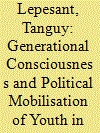

|
|
|
|
|
| Summary/Abstract |
This article is a contribution to theoretical reflection on the notion of generation applied to the study of youth in Taiwan. Starting from the polysemy of this concept, which has remained problematic for the social sciences since the nineteenth century, it shows that beyond the simple demographic cohort, the young people born in the 1980s and 1990s form a new “actual” generation, in the sense of Mannheim, i.e. characterised by objectively distinctive traits and a generational consciousness that contrasts with their elders. It also seeks to explain the process of formation of this generational consciousness and its implications for political mobilisation.
|
|
|
|
|
|
|
|
|
|
|
|
|
|
|
|
| 6 |
ID:
157953
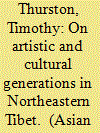

|
|
|
|
|
| Summary/Abstract |
Beginning in the 1980s, and continuing for over three decades since, a particular generation of Tibetans from the Northeastern Tibetan region known as Amdo, and particularly from the northern parts of China’s Qinghai province, has proven extremely productive. Why has this generation, born primarily between 1959 and 1967, been so incredibly successful? This article examines the contextual factors that may have contributed to the incredible success of this generation. This ranges from the policies and circumstances that affected their births, and the state of the cultural field at the time they reached adulthood. Personal experience narratives, autobiographies, and scholarly studies then reveal how this generation was able to access the intellectual field. Finally, I briefly discuss how the Amdo Tibetan intellectual field compares with other Tibetan and ethnic experiences in the People’s Republic of China.
|
|
|
|
|
|
|
|
|
|
|
|
|
|
|
|
| 7 |
ID:
108558
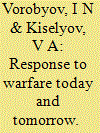

|
|
|
| 8 |
ID:
186931
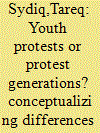

|
|
|
|
|
| Summary/Abstract |
In this article, I argue that contentious ruptures in Iran have produced socio-political generations with differing views on political processes and strategic approaches toward contestations. Using a constructivist approach to sociological generations, I argue that the experience of such events creates ruptures that shape the emergence of generations beyond demographic similarities. While the last event to produce major systemic change was the revolutionary generation, later generations had relative success in shaping relations with the state and defining new political strategies. The most recent protest cycle between December 2017 and November 2019 seems to have the capacity of shaping another generation: One that is defined by a greater disillusionment with the state and a strategy of contention defined by a more decentralized and more adversarial approach regarding state institutions. Barring major changes to accommodate this development, the regime may be facing the emergence of a new generational group whose attitudes and strategies could shape politics in Iran for decades to come.
|
|
|
|
|
|
|
|
|
|
|
|
|
|
|
|